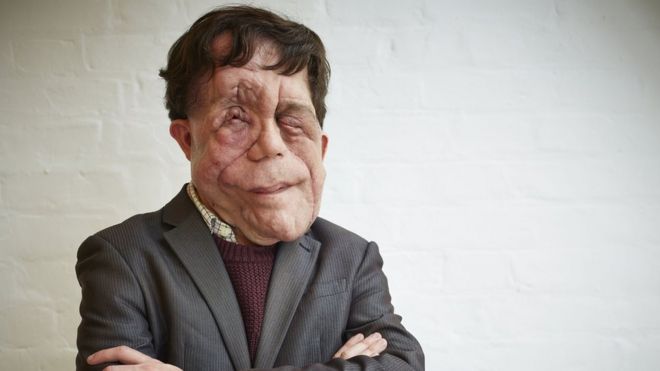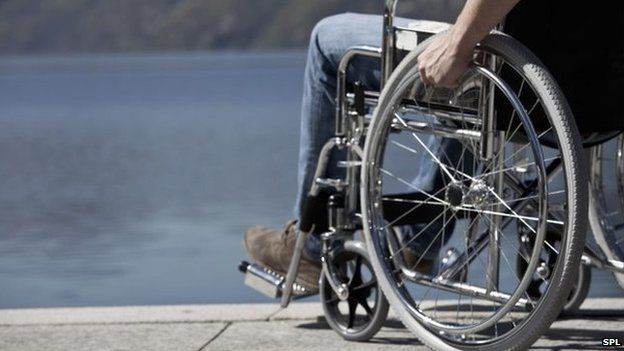What makes a disability hate crime?

People stare at Adam Pearson wherever he goes. But when looks and whispers turn more violent, he is left feeling scared. He looks into the issue of disability hate crime in the UK.
Living with a facial disfigurement, in a busy city like London, means I am rarely invisible. Even something as simple as a train journey can turn into a gauntlet of stares, pointing and whispers.
I have neurofibromatosis type 1, a condition that causes benign tumours to grow on nerve endings - in my case, on my face.
I can understand why people stare. Disfigurement is so widely unrepresented in our media heavy culture it is little wonder people don't know how to react to it. But stares and whispers are not in themselves hate crimes, even if it does mean I have to experience people's prejudice and misconceptions of disability on a daily basis.
When people get drunk, they like to call me names - I have been called 'spastic', 'elephant man' and 'deformed mutant'
While I don't enjoy being looked at constantly, what I experience cannot be labelled as a disability hate crime. That is a more serious issue. The term itself is banded about a great deal, and yet remarkably very few people know what it is or recognise it. It's any criminal offence where the victim, or another person, thinks it has happened because of prejudice based on their disability, or perceived disability.
But the behaviours I do come into contact with, if left unchecked and unchallenged, can become the origins of such hate crime. Pointing and staring can quickly progress into name-calling, particularly on nights out when alcohol is added to the equation.
It's in the pub, when I'm having a pint of beer after a hard week of work that I feel at my most vulnerable and exposed.
When people get drunk, they like to call me names. I have been called "spastic", "elephant man" and "deformed mutant". Whatever motivates such behaviour, following the definition, this is disability hate crime.
Media caption Adam and Lucas talk about the hurtful incidents they both faced at school
I'm certainly not the only one who experiences this.
My friend Lucas also has a facial disfigurement. Growing up, he was also ridiculed, spat at and even had his head stood on. In both of our cases the schools we attended didn't do anything about it. The attitude seemed to be that of "boy will be boys", and the teachers tended to just ignore it.
This is a dangerous attitude to have. School is the place where we learn how to interact with the world around us. The person you become at school quite often acts as the blueprint for who you will be for the rest of your life. When this behaviour happens in the "real world" it is considered hate crime, so by simply labelling it as "bullying" in schools sends out the impression, at a young age that it isn't a crime.
My mother used to count down the school terms. "Only seven more to go," she would say, and I would wake up every morning dreading the days and weeks ahead. Don't get me wrong - I was by no means a fine, upstanding pupil, but nevertheless I felt utterly alone and unsupported.
Media caption Adam and his mother discuss the development of his illness during childhood
The tide is slowly turning though, and schools are taking bullying much more seriously than when I was a pupil 15 years ago. As part of my role as a patron for the charity Changing Faces I go into schools and talk to pupils. I want to teach people about disability while they're young so they know the impact words and actions can have.
People may think I simply need to toughen up and grow a thicker skin, but I think this attitude is part of the problem. When disability hate crime does take place, be it in a relatively mild form such as my own experiences or even in stronger incidents, it often isn't treated as seriously as other forms of hate crime.
This is even more noticeable when looking at the laws surrounding it.
Hate crime laws protect five different minority groups on the grounds of race, religion, sexual orientation, transgender and disability. But there are different laws that cover these groups, and disability is excluded from certain hate crime laws.
Disability hate crime is considered a basic offence, whereas race and religious hate crimes are considered aggravated offences. This means that if someone were to assault me because I'm disabled, the judge has the option of extending the perpetrator's sentence by up to six months, but if the attack was race-related, for example, the sentence can be extended for longer - up to two years.
When I first discovered this I felt frustrated, and still do now. I struggle to see how this is equality.
![]()
Disability hate crime

- Disability hate crime is defined by the CPS as based on offensive, senseless prejudices that have a degrading and destructive impact on the lives of others.
- In 2013/14, there were 44,480 hate crimes recorded by the police in England and Wales. 4%, or 1,985, of these were disability hate crimes.
- Research by the Disability Hate Crime Network showed that 57% of disabled people asked are attacked on the streets.
- Prosecutions for disability hate crime have trebled since 2007, according to the CPS.
Read more:
Disability hate crime 'overlooked by police and CPS'
![]()
While changing the law is difficult, attitudes can be changed more easily. By exposing people to disability you can curb their attitudes towards it and I recently conducted an experiment with Miles Hewstone, a professor of social psychology at the University of Oxford, to demonstrate this.
We carried out an "implicit attitude" test, which measures people's subconscious bias against disfigured people, and the scores showed high levels of innate prejudice. After the test had been conducted the subjects then spent an hour with me, getting to know me and asking me questions. They then did the test again to see if their scores had improved. Nine out of 10 did.
I believe people are capable of great change. Prejudice comes from fear, so if we can increase education and visibility of people with disabilities, this will increase familiarity and therefore lower the level of hostility towards disability in the UK. I think this could, in turn, directly affect the levels of disability hate crime. Sometimes, as a campaigner, it is very easy to feel like a drop in the ocean, but without the drops, there wouldn't be an ocean at all.
Adam Pearson features in the documentary The Ugly Face of Disability Hate Crime which airs on Thursday, 23 July at 21:00 BST on BBC Three as part of the Defying The Label season about disabled people
Follow @BBCOuch on Twitter and on Facebook or email ouch@bbc.co.uk
